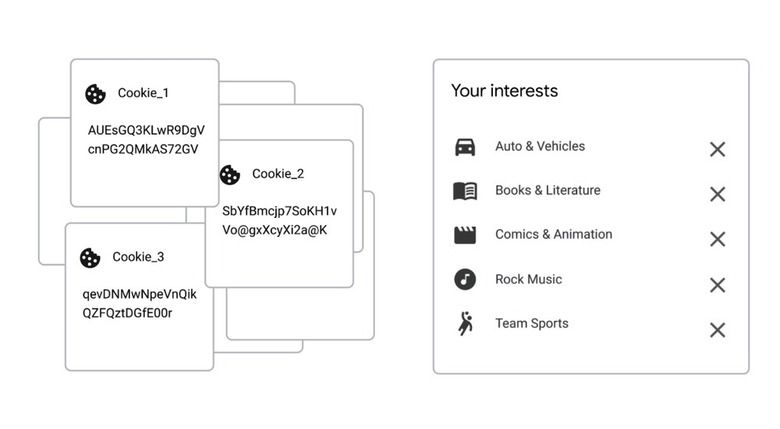Google Is Introducing Yet Another System To Replace Tracking Cookies
Google wants to phase out support for third-party cookies from Chrome, which should be good news for privacy-conscious internet users who don't want to be tracked online. But Google still wants to sell more expensive ads, and that's only possible if advertisers can serve ads that match a user's interests. Some sort of data collection has to happen for targeted ads to exist. Google launched a FLoC (Federated Learning of Cohorts) test for Chrome last year, hoping it would be the user tracking tech to "kill" cookies. The company thought it could improve privacy while continuing to collect data. But FLoC got so much backlash about a year ago that Google had to rethink its strategy. Google went back to the drawing board, and Topics is what it came up with.
Topics is a new technology that allows advertisers to serve targeted ads to users. Google Topics will collect data about users in a less invasive way than cookies. And it should fix some of FLoC's big flaws. At least, that's what Google wants us to believe.
The problem with FLoC last year was that it met fierce opposition from practically every other company making internet browsers. The list includes Brave, Mozilla, and Microsoft. Similarly, the Electronic Frontier Foundation (EFF) came out against FLoC, saying that the system still poses privacy risks to the user. Also troubling was that the FLoC test was opt-out. That meant that Google automatically enrolled Chrome users into testing the feature.
Still, Google says in a blog post that the feedback helped it come up with Topics.
What is Google Topics?
Google describes Topics as "a new Privacy Sandbox proposal for interest-based advertising." It's a new technology that will let websites serve ads based on the user's interests without actually collecting a massive amount of data about the user. Topics are supposed to significantly improve user privacy, according to Google.
For Topics to work, Chrome will determine the topics representing your internet activity. Topics might include things like "Fitness," "Travel & Transportation," and "Sports." The browser will collect the top Topics of the week and keep the information from your past three weeks. Topics will delete old ones. Everything happens on-device, so the Topics will not reach external servers, not even Google's.
Importantly, Google says that Topics will not include sensitive categories, like gender or race. This is already an improvement compared to FLoC. One of the prevalent criticism for that technology was that FLoC might have exposed sensitive interests.
When you reach a site that supports the feature, Topics will pick just three topics from your past three weeks. Each Topic will reflect one of these weeks. The site and advertising partners will get that information. As a result, the ads shown will reflect one of those topics.
When will Topics launch?
Google says that Topics will let browsers like Chrome "give you meaningful transparency and control" over the data you share with a browser.
In Chrome, Google will let you edit the list of Topics and even disable the feature completely. It's unclear what happens if you disable Topics.
"By providing websites with your topics of interest, online businesses have an option that doesn't involve covert tracking techniques, like browser fingerprinting, in order to continue serving relevant ads," Google says.
While Google wants to bring Topics to Chrome, other browsers will also have to support the technology to offer similar protections.
Google says in the announcement that a developer trial of Topics will follow soon, without providing a release date. You can read more about Google Topics over at Google's Privacy Sandbox. Moreover, there's a Topics explainer available on Github. Finally, the short video below shows how Topics is supposed to track your interests privately.

